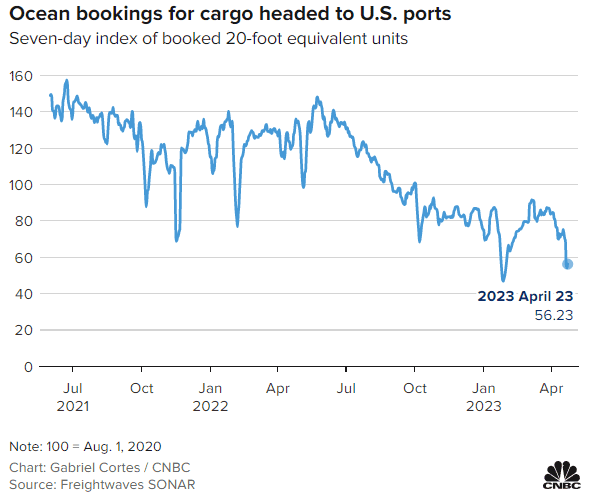For the past at least 18 months, various pundits have been predicting a looming “freight recession” that would hit the bottom lines of various types of carriers, based on what seemed to be indicators of a slowing economy.
But guess what? The freight recession never showed up to a significant degree yet, at least in US trucking. That could finally be changing.
Last week, the American Trucking Associations reported 5.4% month over month decrease in US freight tonnage in March. The index equaled 111.6 (2015=100) compared with 118 in February, meaning freight tonnage was up just 11.6% versus average 2015 numbers now eight years later.
ATA says March’s sequential decline was the largest monthly drop since April 2020 during the start of the pandemic.
Compared with March 2022, the index decreased 5%, which was the first year-over-year decrease since August 2021.
But that is hardly the only sign of much lower freight to move.
A freight recession has been seen in the ocean container shipping sector since last June or so. As seen in the chart below from CNBC, an index of container movements has fall from over 140 early last summer to under 60 currently, a drop of more than 50%.
Container volumes at the ports of LA and Long Beach were at about 800,000 in January 2022, but have steadily fallen since, to more like 600,000 currently.
Meanwhile, a recent CNBC supply chain survey analyzing inventories and warehouse space found a decrease in truck movements in and out of warehouses. There was also a recent 40% decrease in manufacturing orders from China that will result in lower freight movement by both truck and rail soon after.

Just recently, carrier JB Hunt’s president Shelley Simpson said the industry was in the midst of a “freight recession” on a call with analysts.
(See More Below)
|
CATEGORY SPONSOR: SOFTEON |
|
|
| |
|
|
The Cass Information Systems monthly shipments index for March was down 3.8% versus February, and 4.0% versus March of last year.
The monthly Cass report, based on data from the tens of billions of dollars that the company pays on behalf of shippers, is put together by Tim Denoyer, ACT Research.
Looking at the March data, Denoyer comments that “Soft real retail sales trends and on-going destocking remain the primary headwinds to freight volumes, and sharp import declines suggest this type of environment will persist for some time.”
Peter Boockvar, chief investment officer of Bleakley Financial Group, commented to CNBC that “Consumers are still spending on experiences like travel, leisure, and restaurants but with respect to goods, it’s more of a spending focus on non-discretionary items and less on discretionary. This for sure filters through to less stuff being produced and thus transported.”
Any reaction to this freight data? Let us know your thoughts at the Feedback section below.
|